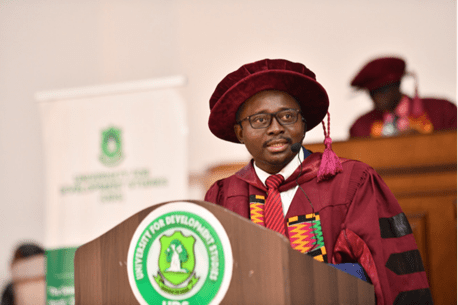The University for Development Studies (UDS) has held its 15th inaugural lecture with a call for investment into aquaculture development to feed the ever-growing human population.
The resource person argued that the fisheries sector of Ghana provides livelihood support to about 2.4 million people and plays a very important role in the national economy, contributing about 1.5 percent to the nation’s gross domestic product (GDP), hence the need to invest more in the sector.
Department of Fisheries and Aquatic Resources Management, Faculty of Biosciences UDS, Prof. Eliot Haruna Alhassan, in a presentation, noted that the fisheries sector contributes by promoting socioeconomic growth, alleviating poverty, and improving the livelihoods of marginalized communities across the world and should be centre of focus.
This year’s lecture held on the theme: “Life below water; development and trajectory of Ghana’s inland fisheries,” forms part of the University’s activities to acknowledge the promotion of a lecturer to full professorship and provide the platform to demonstrate their contribution to academic research work.
Prof. Alhassan emphasized that the benefits of sustainable inland fisheries to livelihood enhancement in the socio-economic development of the country are enormous and therefore needed more investment to make the sector an attractive one for the youth.
Over the past two decades, the sector growth was steady and at an average of three percent per annum, falling short of its expected potential. Foreign exchange earnings from fisheries increased from US$ 165.7 million in 2010 to US$ 309.7 million in 2015, with a corresponding increase in the overall fish production by volume of 9.3 percent between 2010 and 2015 according to the Ministry of Fisheries and Aquaculture Development (MoFAD) 2016 report, he said.
The big threat to life below water, he said, is overfishing and unsustainable aquaculture as Illegal, unreported, or unregulated (IUU) fishing accounts for as much as 53 percent of the reported catch.
In 2017, the total fishery production of Ghana was 448,192.87 tones; of which 314,033.9 tones were from marine capture fisheries, whilst 76,753.66 tones were from inland capture fisheries and 57,405.31 tons from inland aquaculture production.
This implies that 70 percent of the bulk of production is from marine, 17 percent from freshwater, and 13 percent from aquaculture he added.
He noted that aquatic ecosystems like coastal waters, freshwaters, and brackish as well as marine ecosystems serve as food, protein, and source of medicine for man.
“Most of our inland waters especially rivers have been subjected to habitat degradation and aquatic pollution through illegal small-scale mining popularly known as ‘galamsey’ with consequent adverse impacts on water quality, aquatic life, and even humans.
“In order to have healthy communities, we need clean air, natural resources, and a nontoxic environment. Sustainable development, therefore, provides an approach to making better decisions on the issues that affect all of our lives,” he said.
He stressed the need to educate the students on how to manage the resources sustainably for the benefit of future generations. Adding that transboundary water resources such as the Volta basin should be protected by all countries sharing the resource to avoid negative impacts on countries downstream.
Vice Chancellor of UDS, Prof. Seidu Al-Hassan, the Pro-Vice Chancellor, Prof. Felix Kofi Abagale, and all university staff supported the inaugural lecture event.










